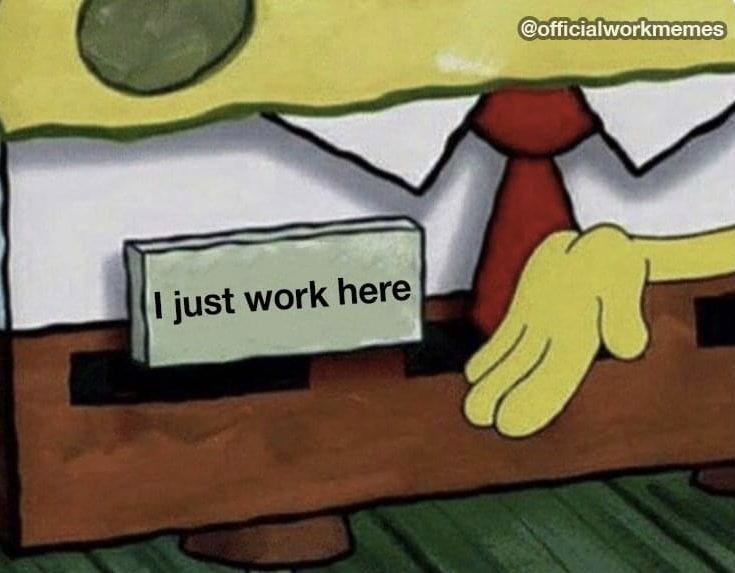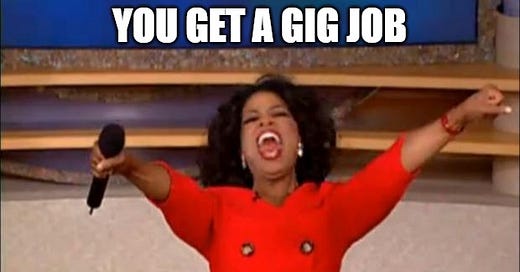The Dark Side to the Death of the 9-to-5
What labor loses as the flex economy grows.
Reid Hoffman, LinkedIn’s founder, venture capitalist, and guy who looks like he just won’t shut up about his SkyMiles status, recently pronounced the 9-5 is dead. Or rather, at death’s door.
And just last week, JP Morgan CEO Jamie Dimon pontificated we’re heading for a future where folks work 3.5 days and live to be 100. Thanks, AI!

Transformation is upon us! AI is here to Cinderella-story the modern worker’s day, alas unbridling us pathetic proletariat from the repetitive, perfunctory pangs of our degrading labor existence. From the ashes of knowledge worker 9-5s will freedom flow, sparking a blaze of newfound gig roles brought by companies prioritizing hyper-specialized and incrementally assigned talent.
Hoffman’s and Dimon’s prediction come bowtied under the newish concept of the “portfolio career.” The bet seems to be in the near future, many of us will consume, buffet plate style, a handful of corporate and creative 10-20 hour/week roles until we’re gorged on a full-time work equivalency. Welcome to the heralded new norm.
This is very funny, because it is itself very corporate. HR approved this concept. It’s a fairly shoe-shined, buttoned up, manscaped script.1
It’s also very corporate because it’s just a rebrand for something that already exists. And that something is called being a freelancer.
Let’s be honest — “portfolio” work kinda sounds groovy. I see these hot-take cheeky naughty CEOs with their cheeky naughty little clickbait headlines and my gut does someting of a cartwheel.
It does a cartwheels because fuck the pervasive, bureaucratic, butts-in-seats, need-my-third-cup-of-coffee-to-survive, automate this, KPI that, quantify-measure-model-scale-accelerate circle jerk that has become the standard corporate ethos. Fuck the mandatory “appropriate” office wardrobe. Fuck the commutes. Fuck the capped, no rollover vacation days. Fuck the taking PTO just to get pencil in that doctor’s appointment or have one beach afternoon with the kids. Fuck the sad desk lunch because you’re too afraid leaving the building for 25 precious minutes will ding up your annual review. Fuck annual reviews. Fuck really anything this contrived, this absurd, this formulated for efficiency and obedience serving an increasingly select, pre-wealthy few.
We could’ve built a world where no one cared. Truly. We could all be eating macarons naked in the sun. We could have a stock market based entirely around French kissing, or potatoes.2 We could’ve all been professional cuddlers, poets, gardeners, nappers, sweet sweet human nothings.
Listen. The eight hour workday is dumb. Plain and simple. Conceptually and functionally — how many more studies do we need indicating no one is productive much past 2-3 hours anyway?
Human flexibility and workplace autonomy is sacred. I believe this. Work digests a tremendous portion of our adulting caloric cadence, so we ought to fight like fuck for better environments, accommodations, compartmentalization, sensibilities, sheer humanity. You’re otherwise miserable — or you get really, really good at dissociatively parroting your love for the game.3
Looser, nimbler employment structures where knowledge workers are expected to perform only their core crafts and skillset, applied across several orgs, for several hours a day max, could also be the first fallen domino to trigger a wider cultural (re)orientation. One tipping the scales closer toward guilt-free leisure, greater ability to use third spaces, and non-monetary hobby valuation. Heck, maybe just more time to take care of life’s generally endless adulting checklist like cooking and cleaning and laundry and errands which feels so tiresome after a full day of work. On and on the promise.
When people so trained to see their self worth as their work finally get to crack open that shell, they’ll be amazed what fresh yolk spills forth.
I want this for all of us. I want a this top-down, complete cultural —> social —> individual psychological reorientation where work is just work. Nothing more, nothing less. I do it here and there, then I stop.
Here’s what I don’t want. And I’m afraid it’s probably going to happen.
There are too many ways a storm of “portfolio careers” would be manipulated if transplanted into our currently anemic system.
Let’s start with the glaring: labor protection limbo. In the ole’ U S of A, legally speaking, W2 employees and contract-based gig workers are not classified the same. This means they are not governed by the same oversight, rules, protections.
And yet most W2 employees must work at least 30 hours a week or 130 hours a month within a set organization, performing work that is deemed business critical to said org, in order to earn the classification and therefore its wider guardrails.
I think you know how this story goes.
Do we really think Big Daddy Corp®️ will suddenly allow its full-time staff, earning full-time pay alongside full-time government-mandated benefits, will let folks drop down to ~10-20 hours of work and still access healthcare, disability, PTO, any pitiful dredge of a paid parental leave policy?
Benefits precarity is already an issue, with or without a change to the definition of full-time work. Again, in the ole’ U S of A, employers are the default providers and gatekeepers of necessary benefits, from health, dental, and vision insurance to 401(k) accounts and paid time off. Nearly 66% of Americans today have health insurance through work. While consensus is a bit muddy, the majority of estimates seem to indicate take-up rates are on the decline for a few decades now, owing in part to employers unable (and unwilling) to shoulder plan and premium costs, passing those costs along to employees themselves, all at rates that outpacing workers’ wages and inflation.
Translation? Americans need these benefits from traditional employers because there’s few, if any, meaningful alternative. But even your best shot is a shit one.

I worry about pendulum swings. A portfolio career sounds nice because work has historically been so un-nice. That is, until you realize the sheer amount of drive required to procure several of these equitable, cozy, well-paying portfolio gigs for yourself — plus the organization, focus, balance, and actually broader skillsets now required in order to juggle each and every one successfully.
Anyone who works as a freelancer knows what I mean. Freelancing is not as romantic as we think. You’ve gone from one neat, tidy role description to wearing all the hats, all the time. Freelancers are their boss and staff. Freelancers are own project managers, sales reps, marketers, HR, tech support, accounting department, quarterly financial planner, public relations specialist, social media manager, and content creator. Freelancers have to self-brand and self-promote, often with an imposter syndrome troll endlessly stomping around their guts. And freelancers have to network. Relentlessly. Somehow you have to get your name out there to land work at all.4
Gig economy work is not sleeping in till 10:30 AM, lounging with your laptop on the couch, sending a few emails, then closing up shop. In fact, I’d argue most of my peers with traditional 9-5 knowledge worker jobs have days that more accurately mirror this, or at least wiggle room for it.
Freelancers, gig workers, portfolio talent — dub it whatever you want. We have a wild distortion around the merits of hustle culture today, the pot of gold waiting on the other side of the rainbow if we just work a little harder, or maybe a little smarter.
All the while, many of us are re-examining what it means to have work-life balance but simply aren’t in places we can sacrifice the benefits and safety nets our overinflated jobs provide.

Because there’s that angle, too: I worry about the sincerity of most cultural labor overhauls that stem from the tippy top down.
It’s not because I think, universally, anyone who’s climbed to the top of a corporation (or even a department) can’t advocate for real, humanism-coded change. I don’t think every person in power hides nefarious intents, or just wants to use and abuse. Not all C-Suites are C-U-Next-TuesdayS.
If anything, the statuses of the Reid Hoffmans and the Jamie Dimons make them supreme mouthpieces — but their world doesn’t mirror our own. It can’t, and never will. They don’t work how we work, worry how we worry, navigate careers how we navigate careers, climb and fall, have everyday perspectives like our everyday perspectives. I doubt they have any conception of the average cubicle Joe Shmo’s work-life realities. But sure, he rubber stamps portfolio work! Isn’t that revolutionarily grand?
And here is where I worry about increasing class resentment. By the very nature of its labor, contemporary manual blue-collar jobs risk higher AI-replacement. That same worker tier generally lacks ease of access to both the horizontal and vertical reskilling that can be flexed somewhat more fluidly (and with less financial risk) by knowledge worker peers. Meanwhile — in case you didn’t know — none of this effects the real wealth class.
So yeah, cool, Joe Schmo the account rep in Chicago gets a 3.5-day work week at home in his slippers putzing for whatever company he damn wants, but Mo Schmo in nearby Burlington is stuck on ten hour shifts with a family living paycheck to paycheck. That’ll definitely help America’s current populism arc.
And I worry about the individual, psychological reorientation. I worry we’re already in a world too chopped up, too apt and rapt with isolation. Now my work self comes similarly sliced and diced?
Is that really such a good thing?

Jeepers, Amy! My my, why all the cynicism??!
Welp, because of history. Because of the consistency that is human exploitation. Because of capitalism — our favorite sea we’re all swimming so deep in it’s hard to even feel the wet.
Because of the (overwhelmingly) male mogul megalodons running these very companies who display blatant antisocial personality disorders self-fashioning themselves as gods of the modern world. Their indulgence? Ever wanting more, more, more. And getting it, at any cost.
Because current U.S. legislation already struggles to keep up with the pervasiveness of the gig economy. With its unique gaps and risks. I’m sure other countries struggle here, too.
Because post-pandemic, people began having earnest interrogations about work-life balance. Maybe for the first time in post-industrial history. And for what? To risk more hyper isolation, more niche-cornered talent, more big dogs on top patting themselves on the back for shaping something that just risks emptier pockets, emptier selves?
But hey, I don’t even have a SkyMiles account.
I guess “jean patch” or “chop shop” career doesn’t have the same spit-shine to it. Or, ya know, just saying freelancer.
I fucking love potatoes.
Need proof? Try logging onto LinkedIn.
Again, may I refer you to LinkedIn?





Ohhh yeah. This is definitely just a push to avoid paying benefits. Everyone’s a fucking freelancer. Truck drivers are freelancers renting their trucks from the shipping companies, delivery guys are freelancers, Amazon has nothing to do with them, they’re just independent freelancers you guys.
It’s all gross honestly. And the number of people with secure income would/ will plummet with this switch. Which is, you know, the point of it.